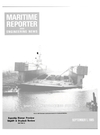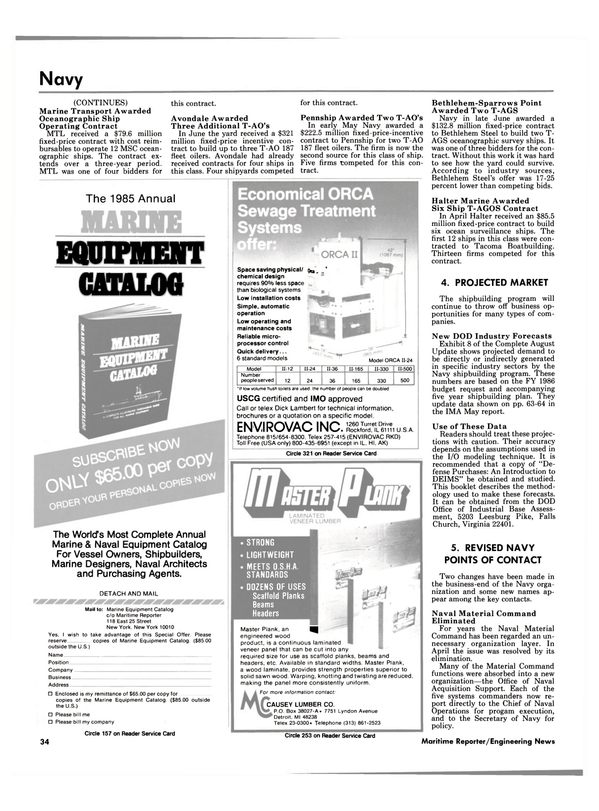
New Alarm Reduces Boiler Failures, Diesel Failures And Repair Costs
—Free Brochure Available Since nearly the beginning of shipboard and power station boiler use, little thought or consideration has been given to boiler protection from oily condensate return caused by seal failure from the turbines.
The U.S. Navy, to protect their boilers, used double-walled boiler tubes. The weight increase, however, caused weight problems in the submarine fleet. In addition, initial cost of manufacturing was much higher than for standard systems.
Where the steam pressure is higher than the lubrication pressure, no problem exists until routine boiler shutdown, then leakage may occur and is not discovered until boiler tube failure from lack of heat transfer.
Biospherics Incorporated, Rockville, Md., has now developed a selfcleaning, on-line, oil-in-water alarm which can withstand temperatures up to 250° F. This unit, placed directly into the condensate return lines, will alarm and trigger switch closure on as little as 2ppm oil-inwater, thus saving the boiler accidental damage.
In addition, damage to diesel engine cylinder walls is often due to "hot spots" created by oily deposits caused by seal or gasket failure, allowing lubrication oil to enter the cooling jackets and act as an insulator.
The BA-200 HT, introduced by Biospherics, is said to be ideal for diesel protection, and is already installed on the diesel engines of the Canadian Coast Guard's Ice Breakers.
The unit is unaffected by common coolant additives. Although this model is a commercial one, it was found to be able to withstand the continuous shock and vibration of the Bombardier engines used in this class of vessel.
Shipowners and diesel engine manufacturers interested in obtaining further information on this "inexpensive insurance policy," should Circle 62 on Reader Service Card
Read New Alarm Reduces Boiler Failures, Diesel Failures And Repair Costs in Pdf, Flash or Html5 edition of September 1985 Maritime Reporter
Other stories from September 1985 issue
Content
- Tidewater Marine Acquires 5 Vessels From Otto Candies page: 5
- Hawker Siddeley/Kongsberg Collaborate In Venture page: 5
- American Air Filter Offers N e w Brochure On Cartridge Filters page: 5
- Big Supply Vessel 'Nicor Sailor' Converted By Eastern Marine page: 6
- Owen And Richards Named Managers At Honeywell page: 6
- MSC Announces FSS Award Totaling $30.7 Million page: 6
- Autronica's New NK-5 Unit Monitors Ship's Engine page: 6
- Grow Group Acquires Napko Coatings Division page: 6
- Bollinger Shipyard Dedicates Island Class USCG Patrol Boat Fleet page: 7
- Sulzer ZA40 Diesels Will Power Two Ferries Ordered In U.K. And Japan page: 8
- Cummins-Powered Construction Pushboat Delivered By Keith A. Record page: 8
- Tenneco Oil And Sohio Will Use Canmar Rig For Arctic Drilling page: 8
- Canadian Offshore Resources Exposition page: 8
- Shipboard Liquid-Level Sensor O f f e r e d By Tecnomatic Controls page: 9
- Maritime Association Installs New Officers And Directors page: 9
- Royal Cruise Line To Build Two Luxury Liners At Cost Of More Than $200 Million page: 10
- Goldstein Named Chairman Of COMSAT—Joseph Promoted To President page: 10
- Krupp MaK Consolidates In North America page: 11
- Innovative Triple-Screw Tugboat Launched By Halter Marine page: 11
- Truman Joins INDEECO As A d v e r t i s i n g Manager page: 12
- Moss Point Marine Delivers New Sternwheeler, Colonel page: 12
- Aluminum Boats Delivers High-Speed Crew/Utility Vessel To A&P Boats page: 12
- Matson Asks Bids On $30 Million Conversion of 'Matsonia' page: 14
- Brown & Root Awarded Feasibility Study Contract For Chevron Offshore Unit page: 15
- Congressional Maritime Caucus Establishes An Advisory Board page: 15
- SHIPLIFTING AND DRYDOCKING SYSTEMS page: 16
- OUTSTANDING RIG DESIGNS page: 16
- Bethlehem's Newest Jackup Design Can Drill In Water 600 Feet Deep page: 19
- Congressman To Address OMSA Meeting On Warehouse Vessels page: 19
- Alsthom Unit Strengthens Position In Norwegian Offshore Market page: 20
- Sandy Hook Dispatch Boat Delivered By Gladding-Hearn page: 20
- Saab Receives Order To Supply TankRadars From Tampa Shipyard page: 21
- Bertrem Products Importing Straub Couplings For U.S. And Canadian Distribution page: 21
- Conversion Of Fast Sealift Ship 'Regulus' Completed By NASSCO page: 22
- ASRY's 1984 Revenues Up Nearly 20 Percent page: 22
- Wartsila Wins Contract To Build Rig Transport Vessel For USSR page: 22
- E X P O S H I P Riomar85 page: 24
- Midland Ross Offers Free, 20-Page Brochure On Max-Gard® System page: 25
- Wilson W a l t o n Receives Two Contracts For Emergency Service page: 26
- Sale Of Imperial Survival Suits Approaches 100,000 page: 26
- Laursen Selected As New Managing Director Of Hemple Holding page: 28
- Owen And Richards Named Managers At Honeywell's Marine Systems Division page: 28
- CANADIAN SHIPBUILDING AND REPAIR YARDS page: 28
- Hollming Opens Louisiana Office For Marketing Aquamaster Product Line page: 29
- Two N e w Instruments To Measure C u r r e n t / V o l t a ge Introduced By Amprobe page: 29
- U.S. NAVY SHIP PROCUREMENT page: 30
- Holman and Wildasin Elected At Raymond International page: 31
- MIROS To Market New Products In U.S. page: 32
- Furuno Introduces New Low-Cost, High-Performance Loran Navigator page: 32
- NMEA Plans Expansion Of Interface Standard page: 32
- Kockums Completes Advanced Car/Truck Carrier For Wallenius page: 33
- Cincinnati Gear Completes Testing Of New, Sophisticated Marine Drive For Navy T-AO 187 Class Oilers page: 34
- New Alarm Reduces Boiler Failures, Diesel Failures And Repair Costs page: 34
- ADS Workshop Scheduled For October 2-3 In Chicago page: 35
- Seattle Yard GM Elected To Todd's Board Of Directors page: 35
- Caterpillar Offers 20-Page Catalog On Marine Diesels page: 35
- Wagner Wins $4.5-Million Contract For Steering And Control Systems page: 35
- Three Major Beth Steel Programs Highlight New Offerings To The Offshore Industry page: 36
- LiCausi Establishes New Boiler Consultant Firm page: 36
- West Coast Manly Shipyards Delivers Fisheries Patrol Vessel Leonard J. Cowley page: 36
- Free 12-Page Brochure On Marine Control System Offered By Forney page: 37
- Detroit Diesel Allison Announces Significant Engineering Advancements To Its Series 149 Engines page: 37
- Tyne Shiprepair Awarded Defence Ministry Contract To Convert Fleet Auxiliary page: 37
- Product Carrier 'Lucy' Christened At Hyundai's Ulsan Yard For Overseas Shipholding Group page: 38
- New Brochure Highlights Capabilities Of Marathon LeTourneau Offshore page: 38
- Aalborg Vaerft Awarded Danish Navy Contract For Seven Flex 300 Convertible Combatant Vessels page: 38
- McDermott Completes Twin Drilling Rig Ordered By Helmerich & Payne International page: 41
- Meyer Werft Shipyard Converts Containership Into Livestock Carrier page: 41
- Marine Drive Systems Announces N e w Shaft Systems page: 41
- N e w X-FLO Turbo Compressor Represents Major Advance In Impeller Technology page: 41
- Kockums Yard To Build Universal Ferry For Polish Shipping Company page: 41
- Transtema Kockumation Introduces New Computer System For Shipping Industry page: 41
- Huge Drydock At Bethlehem's New Sabine Yard Now Operational page: 42
- Marinette Marine Lays Keel For First Of 13 Yard Patrol Craft page: 42
- Avondale's Harvey Division Finishes Major Refurbishing Of Offshore Tug page: 44
- Meco's " T a r g a " Technology Boosts Water Maker Efficiency page: 45
- Orders A n d Deliveries Of T w i n - S c r ew Schottel-Tugs Continue W o r l d w i de page: 45
- N e w M e t h o d Of Inspection Used By Pacific M a r i ne Is Cost-Effective page: 45
- Report Shows Amerlock 400 To Be Cost-Effective Maintenance And Repair Coating page: 46
- MHI Develops Energy-Saving Marine Super Turbo Generating System page: 46
- Centurion Industrial Marine Offers The 'Crew Seat page: 47
- New Brochure Available From SKF Steel Couplings On Its OK Coupling page: 47
- New Instrument Manifold Improves Safety In Process Control Systems page: 47
- Inventive Machine Introduces Improved B l a s t / V a c u um Units page: 54
- Barksdale Controls Presents Line of Pressure Transducers page: 54
- Limitorque Introduces New Worm Gear Operators For Valve Or Mechanism Control page: 54
- Electronic Mail Techniques Save Thousands Of Dollars In Message Costs, According To NAV-COM Report page: 55
- Uniden To Introduce Six New Marine Radio Models At IMTEC Show In Chicago page: 55
- A New 12-Inch Radar From Krupp Atlas Elektronik page: 55


